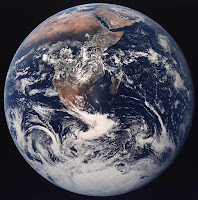THE SOLAR SYSTEM .Our home in space
Our star, the Sun , is at the center of the Solar system.It's orbited by eight planets,trillions of asteroids and comets and a few dwarf planets .
The eight planets .Divided into four planets like ours:
- Terrestrial planets :- Mercury,Venus,Earth and Mars .
- Gas Giants :- Jupiter ,Saturn, Uranus and Neptune .
Terrestrial planets :-
- Mercury is the smallest and lightest of all the planets.A Mercury year is shorter than the Mercury day, which leads to enormous fluctuations in temperature.Mercury doesn't have an atmosphere or a moon.
- Venus is one of the brightest objects in the Solar system and by far the hottest planet,with atmospheric pressure that is 92 times higher than on Earth. An out-of-control greenhouse effect means the Venus never cools below 437 degree Celsius. Venus also doesn't have a moon.
- Earth is our Home and the only planet with temperature that are moderate enough to allow for the surplus of liquid water. Furthermore,it's so far the only place where life is know to exist.The Earth has one moon.
- Mars is the second smallest planet in the Solar system,and hardly massive enough to keep a very thin atmosphere.Its Olympus Mons is the largest mountain in the Solar system,more than three times as high as Mount Everest .Mars has two small moons.
Gas Giants :-
- Jupiter is the largest and most massive planet in the Solar system . It consists largely of hydrogen and helium and is the theater for the largest and most powerful storms we know.Its largest storm,the Great Red Spot is three times as large as Earth. Jupiter has sixty-seven moons.
- Saturn is the second largest planet and possesses the smallest density of all the planets.If you had a sufficiently large bathtub,Saturn would swim in it.Saturn is also known for its extended,very visible ring system.It has sixty-two moons.
- Uranus is the third largest planet and one the coldest ,Of all the Gas Giants,it's also the smallest.The special thing about Uranus is that its axis of rotation is tilted sideways in contrast to the seven other planets.Uranus has twenty-seven moons.
- Neptune is the last planet in the Solar system and is similar to Uranus.It's so far removed from the Sun that a Neptune year is 164 Earth years long.The highest wind speed ever measured was in a storm on Neptune,at just under 2,100 km/h.Neptune has fourteen moons.
2.Trillions of asteroids and comets also circles it.Most of them are concentrated into two belts:
- The Asteroid belt between Mars and Jupiter.
- The Kuiper belt at the edge of the Solar system.
These belts are home to countless objects,some as large as a dust particle,others the size of dwarf planets.The most well-known object in the asteroid belt is Ceres,the most well-known in the Kuiper belt are Pluto ,Makemake and Haumea. Usually we describe the asteroid belt as a dense collection of bodies that constantly collide.But in fact,the asteroids are distributed across an area that is so indescribably large that it's even difficult to see two asteroids at once.Despite the billions of objects in them,the asteroid belts are fairly empty places. And nonetheless,there are collisions over and over again.The mass of both belts is also unimpressive the asteroid belt has a little less than 4% of our Moon's mass,and Kuiper belt is only between one 25th and one 10th of Earth's mass.
3.One day,the Solar system will cease to exist .The sun will die ,and Mercury ,Venus and maybe Earth too will be destroyed. In 500 billion years it will become hotter and hotter until at some point it will melt Earth's crust. Then the Sun will grow and grow and either swallow Earth or at least turn ti into a sea of lava.When it has burnt up all its fuel and lost most of its mass, it will shrink to a white dwarf and burn gently for a few billion more years before it goes out entirely.Then ,at the latest ,life in the Solar system will no longer be possible.The Milky way will not even notice it.A small part of it in one of its arms, will become just a tiny bit darker.And mankind will cease to exist or leave the Solar system in search of a new home.
CLICK HERE












No comments:
Post a Comment